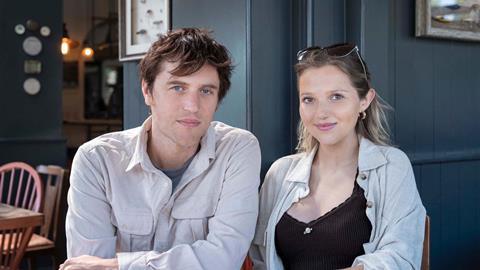Mia McKenna-Bruce talks to Johnny Flynn — a Star of Tomorrow back in 2005 — about acting for stage and screen, role immersion and balancing work with family life.
Mia McKenna-Bruce — a Star of Tomorrow for 2023 — was just shy of her eighth birthday when Johnny Flynn received the same accolade in 2005, as Joe Flynn, his professional name at the time. In the ensuing 18 years, Flynn has starred in films including Beast (2017) and Emma (2020); played David Bowie in Stardust (2020), Ian Fleming in Operation Mincemeat (2021) and a young Albert Einstein in the first season of US TV series Genius. He has also forged a music career as singer-songwriter with Johnny Flynn & The Sussex Wit, and he is nearing the end of an acclaimed National Theatre run, playing Richard Burton — opposite Mark Gatiss as John Gielgud — in Jack Thorne’s The Motive And The Cue directed by Sam Mendes.
Former child actress McKenna-Bruce broke out as the lead in Molly Manning Walker’s How To Have Sex, playing a 16-year-old Brit on a package holiday having first experiences with sex (see page 8). The film won the Un Certain Regard prize at Cannes Film Festival in May.
Flynn has three children with his wife, theatre designer Beatrice Minns — and McKenna-Bruce is pregnant with her first child, with actor fiancé Tom Leach. Family responsibilities were a key discussion point for Flynn and McKenna-Bruce, who also talked about how much of oneself to give to a role, and when to say no as an actor.
Mia McKenna-Bruce: Do you have a different way of preparing for theatre?
Johnny Flynn: I’m ‘thinky’ to a fault. I now know that I can do all my thinking and get all my angst into the rehearsal period. The play I’m in currently, we spent seven weeks rehearsing and talking. That suits me — I like hiding behind the conversations. You exercise all those thoughts, anxieties and problems that you think you need to solve. It’s an invisible architecture; everyone in the company is trying to make sure we’re looking at the same space that exists in all our minds.
That’s quite different from film. When I’ve done films where I’ve rehearsed, I’ve loved it. But also with film, sometimes a director is trying to surprise you. The power and knowledge is not with the actors. Your job is to be fresh, open and spontaneous. It’s taken me a while to unlearn that ‘thinky’ way.
McKenna-Bruce: The ‘thinky’ side is the petrifying part for me. I like being able to do whatever, whenever. When I started auditioning as an adult, they’d ask me questions about acting. I’d be like, “I have no idea, I don’t know — I just do the thing!”
Flynn: But thinking is overrated. Get rid of the thinking! An actor I respect said, “Don’t take the coach into the match when you’re in front of the camera. Don’t let him be in your ear all the time — tell him to fuck off.” There is a lot that we have to know. But then once you know it, you don’t need to think about it. Then just be, and just play.
McKenna-Bruce: That’s it — doing the work prior. I have worked with people who need to break down each scene and know exactly what’s making them say each thing at each moment in time. I tried it once; for me, that doesn’t work. If I put in the work first of knowing the character’s journey to get to where we’re telling this story, I don’t then need to break down each scene. When we’re having conversations in real life, I’m not thinking, “Why am I saying this?”
Flynn: I never used to get stage fright. Then in my 20s, I’d been doing theatre for years, and almost had a panic attack on stage. After, I was like, “Oh shit, you can get nervous on stage.” Then it was about learning to be nervous.
McKenna-Bruce: That’s so true — learning to be nervous. When I was younger, there was no expectation of what I could or couldn’t do.
Flynn: It’s all so fresh and exciting. You don’t have any projection or baggage around it.
McKenna-Bruce: You’ve played a lot of real people. Does that make the question of living as the character any different?
Flynn: If I had lived as any of the people that I’ve played, I wouldn’t be alive. Ian Fleming drank two bottles of whisky a day, chain-smoked; even Einstein was quite wild. I did three plays and a film with Mark Rylance. He’s not explicitly a method actor but is thorough at diving into characters. If you bump into him in the wings, he is his character.
I was sharing a dressing room with him doing two Shakespeare plays in rep. He was playing Olivia in Twelfth Night, and then [the title role in] Richard III. When we were getting ready, the difference in how he’d talk to you — depending on whether he was playing Olivia or Richard — was so funny. Weirdly, in both he was supposed to be in love with my character. If he was playing Olivia, he’d be coquettish and coy with me; if he was playing Richard III, he’d look like he was going to do something naughty to me. He’s very clear that you do have to protect yourself — you have to be careful with that.

McKenna-Bruce: Because How To Have Sex was so naturalistic and true to life, the main thing was we had a supportive cast and crew. You always had someone you could turn to. It’s stories that I can relate to, especially being on holiday as a teen. Reality did mix with that. I’ve got two younger sisters, and I felt like I was protecting them in telling this story. I still struggle with reality and being on a job. Especially working away from home — staying in contact with family and friends. Do you have a specific thing you do to check in?
Flynn: When I was named a Star of Tomorrow, I was doing my first film [2005 fantasy adventure Crusade In Jeans], for almost a year around Europe. I didn’t think to call my mum at the time — I was having such an adventure and didn’t want to miss a single moment of hanging out with this new tribe that I’d found. That’s a young person’s prerogative: that’s how you learn about the world, by forgetting everything except this moment. If it’s a healthy environment it can be a positive experience. Film sets can be beautiful ecosystems of people looking out for you.
Then when I had a kid, I wanted to be deeply immersed in that. I was doing a play up until a few days before my son was born, and I made some close friends. I remember feeling, “This is the last time I’ll be able to forget about everything.” But as soon as my son arrived, the necessary, constant thread of connection to my family was there. Our family has adjusted to what I do, but I’m religious about checking in, and it makes me happy. I have to FaceTime them, and get back as much as I can. I don’t stay [on location] for the weekend if I’ve got two days off. If there’s any way I can get home, I do, and that’s my rule. I try and build it into contracts as well. It’s hard for the people that are left behind, but if you make that effort, it pays off.
McKenna-Bruce: Do your family ever travel with you?
Flynn: I bring them out when they can. Once the kids get to school age then it becomes tricky — the state primary schools don’t allow you to miss too much school. Until they’re five, take every available job to go around the world.
McKenna-Bruce: How do you feel about saying no to jobs?
Flynn It’s the only power we have as actors. That autonomy is how you carve a sense of yourself. You tell the people around you who you are by how you say no. Sometimes it seemed obvious to my agents that I should entertain a certain idea and I’ve been quite firm saying no. Afterwards, they say, “This other thing came in that was really right — and somehow you knew that.” But I didn’t know that other thing was going to come in! I just knew [the first] wasn’t right. I’ve fought hard to maintain an ambiguity as a character actor that can move around. I haven’t chased big roles, and just waited to see what happens.
McKenna-Bruce: I want to do something with action. I’ve worked on things where I haven’t been doing the action but have seen the stunts.
Flynn: I haven’t done anything action-heavy, but any time there’s the tiniest stunt, I say, “I’ll do it.” Playing Richard Burton right now, when he’s being directed by John Gielgud — those guys played every great classical role as a matter of course. I’ve barely touched any classical roles. For young actors it’s not a requirement anymore. At its best, being an actor is an expansion of your consciousness — so I would like to try a couple more big classical roles. But an action film sounds cool as well. I’d like to jump off a cliff.
McKenna-Bruce: Why not both? Combine the two!
Flynn: Why not?!


























No comments yet